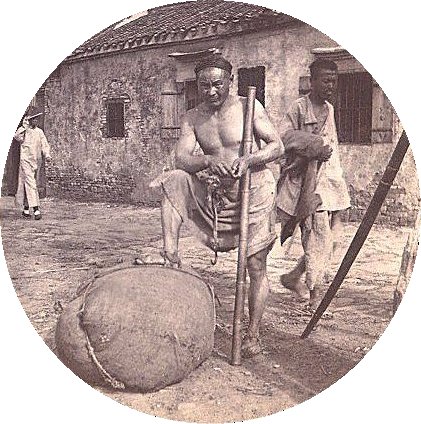The term "coolie" is probably of Indian origin and is thought to be derived from the Hindi word "quli" which means "hired labourer". Coolies were labourers imported into various colonies in the Americas, Africa, and Asia during the 19th and 20th centuries. Most of them were recruited under indenture, though some entered the colonies as free men.
Periodic poor harvest, famines, increased stress on agricultural land and political upheavals are some of the factors which drove people from places such as China and India to the colonies which needed vast number of manual labourers.
The key ports from which coolies were shipped abroad included Xiamen, Shantou, Hong Kong, Macau, and Nagapatnam. The journeys made by the coolies to Singapore were terrifying. The coolies were herded across the sea confined in crowded, squalid, and unsanitary conditions. Hundreds died on the journey. On one junk that arrived in Singapore from Macau in 1863, only 120 of its 300 passangers were still alive.
By late 19th century, Singapore had become the center of the import of Chinese coolies to work in mines, plantations and ports of colonial South East Asia. Coolies were also retained to work in Singapore. Indians and Javanese also joined the vast number of Chinese coolies in Singapore. The coolies heaved coal, carried goods, tapped rubber, worked on plantations, worked on lighters, ladi cables and tracks for trams, built and repaired roads, and were also involved in construction and reclamation projects. Many also worked as ricksaw pullers.
With some exceptions, coolid led bitterly hard lives. Retiring to cramped living quarters after toiling hard work, several sought relief in opium smoking. Many stayed on after serving out their indentures and pald up the debts owed to their recruiters and labour brokers. Some were cheated of their life savings just before they were due to return to China.
Periodic poor harvest, famines, increased stress on agricultural land and political upheavals are some of the factors which drove people from places such as China and India to the colonies which needed vast number of manual labourers.
The key ports from which coolies were shipped abroad included Xiamen, Shantou, Hong Kong, Macau, and Nagapatnam. The journeys made by the coolies to Singapore were terrifying. The coolies were herded across the sea confined in crowded, squalid, and unsanitary conditions. Hundreds died on the journey. On one junk that arrived in Singapore from Macau in 1863, only 120 of its 300 passangers were still alive.
By late 19th century, Singapore had become the center of the import of Chinese coolies to work in mines, plantations and ports of colonial South East Asia. Coolies were also retained to work in Singapore. Indians and Javanese also joined the vast number of Chinese coolies in Singapore. The coolies heaved coal, carried goods, tapped rubber, worked on plantations, worked on lighters, ladi cables and tracks for trams, built and repaired roads, and were also involved in construction and reclamation projects. Many also worked as ricksaw pullers.
With some exceptions, coolid led bitterly hard lives. Retiring to cramped living quarters after toiling hard work, several sought relief in opium smoking. Many stayed on after serving out their indentures and pald up the debts owed to their recruiters and labour brokers. Some were cheated of their life savings just before they were due to return to China.
 |
| Chinese coolie - Source: Wikipedia |
The newly arrived coolie recruit was called sin kheh which meant "new arrival" in Hokkien. The secret societies and clan associations were involved in controlling and regulating the immigration of coolies from China. Secret societies would help the peasants pay for their journey to Singapore. Upon arrival, the majority of the early coolies would be handed over to employers of the same dialect, The kongsi, or a "clan association" was either an organisation, a group or a network of like-minded individuals speaking the same dialect or from the same province/part of China. The secret societies therefore acted as agents helping the peasants to come to Singapore, and to find employers from a certain kongsi, depending on the dialect of the particular peasant. Recruitment was carried out based on dialect connections. The secret societies helped support the coolies financially in times of illness, defended their livelihoods and organised final rites. The British however felt threatened by the rising power and prominence of the secret societies, and made these societies illegal in 1890. An official Chinese Protectorate was set up to handle the immigration and official procedures for coolies. Voluntary associations also arose, supporting the coolies in their immigration and transition into Singapore.



No comments:
Post a Comment